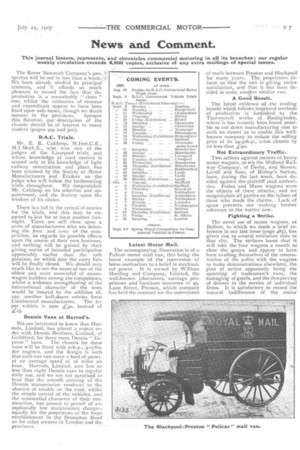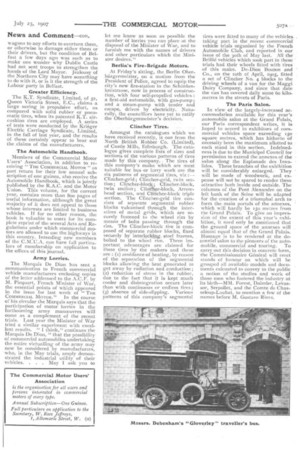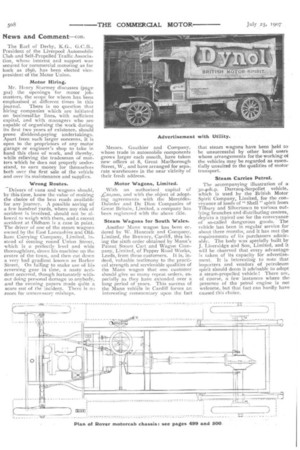News and Comment.
Page 11

Page 15

Page 16

If you've noticed an error in this article please click here to report it so we can fix it.
This journal fosters, represents, and chronicles commercial motoring in all its branches: our regular weekly circulation exceeds 8,000 copies, exclusive of any extra mailings of special issues.
The Rover Motorcab Company's prospectus will be out in less than a 'week. We have already studied its principal contents, and it affords us much pleasure to record the fact that the promotion is a remarkably " clean " one, whilst the estimates of revenue and expenditure appear to have been fixed upon safe bases, though we doubt success in the provinces. Apropos this flotation, our description of the chassis should be of interest to many readers (pages 499 and 500).
R.A.C. Trials.
Mr. E. R. Calthrop, M.Inst.C.E., M.I.Mech. E., who was one of the judges of the Liverpool trials, and whose knowledge of road motors is second only to his knowledge of light railway construction and plant, has been retained by the Society of Motor Manufacturers and Traders as the judge who will follow the forthcoming trials throughout. We congratulate Mr. Calthrop on his selection and appointment, and the Society upon the wisdom of its choice.
There is a lull in the arrival of entries for the trials and this may be expected to last 'for at least another fortnight. There are still close upon a score of manufacturers who are debating the pros and cons of the competition, as regards its possible effects upon the course of their own business, and nothing will be gained by their giving notice of intended participation appreciably earlier than the Toth proximo, on which date the entry lists will be finally closed. We should very much like to see the name of one of the oldest and most successful of steamwagon builders among the competitors, whilst a welcome strengthening of the international character of the tests would be insured by the addition of, say, another half-dozen entries from
Continental manufacturers. The fee per vehicle is now £30, instead CI
Las.
Dennis Vans at Harrods.
We are interested to know that Harrods, Limited, has placed a repeat order with Dennis Brothers, Limited, of Guildford, for three more Dennis " Ex press " vans. The chassis for these vans will be fitted with 2oh.p., 4-cylinder engines, and the design is such that each van can carry a load of 3ocwt. at an average speed of L6 miles an hour. Harrods, Limited, now has no less than eight Dennis vans in regular daily use, and we are not surprised to hear that the smooth running of the Dennis transmission conduces to the absence of trouble on the road, whilst the simple control of the vehicles, and the substantial character of their construction, has proved to permit of exceptionally low maintenance charges, equally for the proprietors of the huge establishment in the Brompton Road as for other owners in London and the provinces. • Latest Motor Mail.
The accompanying illustration is of a Ptillcar motor mail van, this being. the latest example of the conversion of horse contractors to a belief in mechanical power. It is owned by William Harding and Company, Limited, the well-known johmasters, carriage proprietors and furniture removers of 49, Lune Street, Preston, which company has held the contract ior the conveyance of 'mails between Preston and Blackpool for many years. The proprietors inform us that the vari is giving entire satisfaction, and that it has been deeided to order another similar van.
A Good Result.
The latest evidence of the trading benefit which follows improVed methods of production is furnished by the Thornycroft works at „Basingstoke, where it has recently been found possible to cut down manufacturing cost to such an extent as to enable this wellknown company to reduce the selling price of its 24-3oh.p., 2-ton chassis by no less than /..90.
Not Extraordinary Traffic.
Two actions against owners of heavy motor wagons, to wit the Midland Railway Company, of Derby, and Messrs. Lovell and Sons, of Bishop's Sutton, have, during the last week, been decided against the plaintiff road authorities. Foden and Mann wagons were the objects of these attacks, and we congratulate all parties on the failure of those who made the claims. Lack of space prevents our making further reference to the matter now.
Fighting a Strike.
The novel use of motor wagons, at Belfast, to which we made a brief reference in our last issue (page 485), has given rise to several miniature riots in that city. The strikers boast that it will take the four wagons a month to clear the quays, and appear to have been availing themselves of the concentration of the police with the wagons to make demonstrations elsewhere, the plan of action apparently being the upsetting of tradesmen's vans, the damaging of goods, and the threatening of drivers in the service of individual firms. It is satisfactory to record the natural indifference of the motor
wagons to any efforts to overturn them, or otherwise to damage either them or their drivers, but the condition of Belfast a few days ago was such as to make one wonder why Dublin Castle had not sent troops to strengthen the hands of the Lord Mayor. Jealousy of the Northern City may have something to do with it, or is it the strength of the Labour party in Belfast.
Greater Efficiency.
The K.T. Syndicate, Limited, of 52, Queen Victoria Street, F..C., claims a large saving in propulsive effort, as compared with solid rubber or pneumatic tires, when its patented K.T. aircushion tires are employed. A series of tests were conducted by the Krieger Electric Carriage Syndicate, Limited, in the fall of last year, and the results of these certainly appear to bear out the claims of the manufacturers.
The Automobile Handbook.
Members of the Commercial Motor Users' Association, in addition to receiving " THE COMMERCIAL MOTOR as part return for their low annual subscription of one guinea, also receive the Automobile Handbook, which is jointly published by the R.A.C. and the Motor Union. This volume, for the current year, contains more than 800 pages of useful information, although the great majority of it does not appeal to those whose interests are limited to business vehicles. If for no other reason, the book is valuable to users for its complete reprint of the several Acts and Regulations under which commercial motors are allowed, to use the highways in this country. Intending new members of the C.M.U.A. can have full particulars of membership on application to the offices of this journal.
Army Lorries.
The Marquis De Dion has sent a communication to French commercial vehicle manufacturers enclosing copies of the letter addressed to the A.C.F. by M. Picquart, French Minister of War, the essential points of which appeared in the issue for last week of " THE COMMERCIAL MOTOR." In the course of his circular the Marquis says that the participation of motor lorries in the forthcoming army manceuvres will come as a complement of the recent trials. Last year the Minister of War tried a similar experiment with excellent results. "I think," continues the Marquis De Dion, " that the possibility of commercial automobiles undertaking the entire victualling of the army may now be considered by manufacturers, who, in the May trials, amply demonstrated the industrial utility of their
vehicles. . . May I ask you to let me know as soon as possible the number of lorries you can place at the disposal of the Minister of War, and to furnish me with the names of drivers and other particulars which the Minister desires."
Berlins Fire-Brigade Motors.
At Friday's sitting, the Berlin Oberbiirgerrneister, on a motion from the President of Police, agreed to eqUip the city's new fire-station in the SchOnlankerstrasse, now in process of construction, with four self-propelled vehicles : a first-aid automobile, with gas-pump; and a steam-purnp with tender and escape, driven by electricity. Naturally, the councillors have yet to ratify the Oberbfirgermeister's decision.
Clincher Tires.
Amongst the catalogues which we have received recently, is one from the North British Rubber Co. (Limited), of Castle Mills, Edinburgh. The catalogue gives complete lists of sizes and sections of the various patterns of tires made by this company. The tires of this company's make which are most suitable for bus or lorry work are the six patterns of segmental tires, viz :— Clincher-grid ; Clincher-grid, twin section; Clincher-block; Clincher-block, twin section; Clincher-block, Arrowhead section, and Clincher-block triple section. The Clincher-grid tire consists of separate segmental rubber blocks vulcanised through the interstices of metal grids, which are securely fastened to the wheel rim by means of bolts passing through the rim. The Clincher-block tire is composed of separate rubber blocks, fixed securely by interlocking steel frames, bolted to the wheel rim. Three important advantages are claimed for these tires by the makers and these are : (I) avoidance of heating, by reason of the separation of the segmental blocks allowing the heat generated to get away by radiation and conduction;
(2) reduction of stress in the rubber, due to the fact that it is kept much cooler and disintegration occurs later than with continuous or endless tires ; (3) absence of side-slipping. Various patterns of this company's segmental
tires were fitted to many of the vehicles taking part in the recent commercial vehicle trials organised by the French Automobile Club, and reported in our issue of the 3oth of May last. All the Brillie vehicles which took part in these trials had their wheels fitted with tires of this make. De-Dion Bouton and Co., on the loth of April, 1905, fitted a set of Clincher No. 4 blocks to the driving wheels of a van for the Maggi Dairy Company, and since that date the van has covered daily some 6o kilo:metres in the streets of Paris.
The Paris Salon.
In view of the largely-increased accommodation available for this year's automobile salon at the Grand Palais, our Paris correspondent writes, it is hoped to accord to exhibitors of commercial vehicles space exceeding 150 square metres, which has hitherto of necessity been the maximum allotted to each stand in this section. Indebtedness is due to the Municipal Council for permission to extend the annexes of the salon along the Esplanade des Invalides. These branches of the exhibition will be considerably enlarged. They will be made of woodwork, and expense will not be spared to render them attractive both .inside and outside. The columns of the Pont Alexandre on the left bank of the Seine will be adapted for the creation of a triumphal arch to form the main portals of the annexes, which will hardly be iso metres from the Grand Palais. • To give an impression of the extent of this year's exhibition, it need only be mentioned that the ground space of the annexes will almost equal that of the Grand Palais. Homage is to be rendered at the decennial salon to the pioneers of the automobile, commercial and touring. To carry out this decision in concrete form, the Commissionaire General will erect stands of honour on which will be grouped all available models and documents calcuated to convey to the public a notion of the studies and work of those men who fostered the industry at its birth—MM. Forest, Daimler, Levassor, Serpollet, and the Comte de Chasseloup-Laulaat, to mention a few of the names before M. Gustave Rives.
The Earl of Derby, K.G., G.C.I3., President of the Liverpool Automobile Club and Self-Propelled Traffic Association, whose interest and support was secured for commercial motoring as far back as 1896, has been elected vicepresident of the Motor Union.
Motor Hiring.
Mr. Henry Sturmey discusses (page 502) the openings for motor jobmasters, the scope for whom has been emphasised at different times in this journal. There is no question that hiring companies which are initiated on businesslike lines, with sufficient capital, and with managers who are capable of organising the work during its first two years of existence, should prove dividend-paying undertakings. Apart from such larger concerns, it is open to the proprietors of any motor garage or engineer's shop to take in hand this class of work, and thereby, while relieving the tradesman of matters which he does not properly understand, to earn money for themselves both over the first sale of the vehicle and over its maintenance and supplies.
Wrong Routes.
Drivers of vans and wagons should, by this time, know the value of making the choice of the best roads available for any journey. A possible saving of a few hundred yards, where any risk of accident is involved, should not be allowed to weigh with them, and a recent accident at Oldham is a case in point. The driver of one of the steam wagons owned by the East Lancashire and Oldham Carrying Company, Limited, instead of coming round Union Street, which is a perfectly level and wide thoroughfare, drove his machine up the centre of the town, and then cut down a very bad gradient known as Barker Street. On failing to make use of his reversing gear in time, a nasty accident occurred, though fortunately without doing personal damage to anybody, and the evening papers made quite a scare out of the incident. There is no room for unnecessary mishaps. Messrs. Gauthier and Company, whose trade in automobile components grows larger each month, have taken new offices at 8, Great Marlborough Street, W., and have arranged for separate warehouses in the near vicinity of their fresh address.
Motor Wagons, Limited.
With an authorised capital of 20,00o, and with the object of adopting agreements with the MercedesDaimler and De Dion Companies of Great Britain, Limited, a company has been registered with the above title.
Steam Wagons For South Wales.
Another Mann wagon has been ordered by W. Hancock and Company, Limited, the Brewery, Cardiff, this being the sixth order obtained by Mann's Patent Steam Cart and Wagon Company, Limited, of Pepper Road Works, Leeds, from these customers. It is, indeed, valuable testimony to the practical strength and serviceable qualities of the Mann wagon that one customer should give so many repeat orders, especially as they have extended over a long period of years. This success of the Mann vehicle in Cardiff forms an interesting commentary upon the fact that steam wagons have been held to he unsuccessful by other local users whose arrangements for the working of the vehicles may be regarded as essentially unsuited to the qualities of motor transport.
Steam Carries Petrol.
The accompanying illustration of a 3o-4oh.p. Darracq-Serpollet vehicle, which is used by the British Motor Spirit Company, Limited, for the conveyance of loads of" Shell " spirit from Tilbury and Silvertown to various outlying branches and distributing centres, depicts a typical use for the conveyance of so-called dangerous goods. The vehicle has been in regular service for about three months, and it has met the requirements of its purchasers admirably. The body was specially built by J. Liversidge and Son, Limited, and it will be observed that every advantage is taken of its capacity for advertisement. It is interesting to note that importers and vendors of petroleum spirit should deem it advisable to adopt a steam-propelled vehicle There are, of course, a few instances where the presence of the petrol engine is not welcome, but that fact can hardly have caused this choice.
























